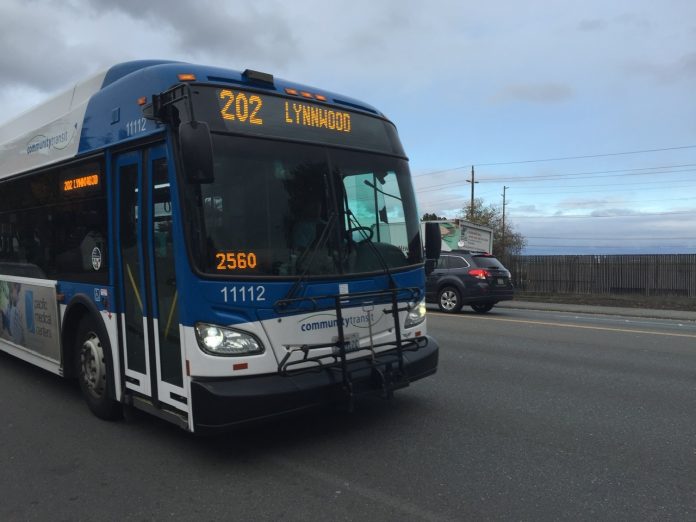On Saturday, March 1, Community Transit will begin rolling out some fare changes aligning its reduced fare policy with partner transit agencies in Puget Sound, just a few weeks ahead of the agency’s first service change of the year. The fare changes will benefit low-income riders, seniors, Medicare recipients, and disabled riders, as fares drop from $1.25 to $1.00 for these riders. Some riders may also be eligible for free fares.
Reduced fares will apply to riders that are low-income and qualify for the ORCA Lift program as well as seniors (aged 65 or older), disabled riders, and Medicare recipients. The $1.00 reduced fare, however, won’t apply to DART paratransit service, which will remain at $2.50 per trip.
Regular adult fares for local, express, and Swift buses as well as DART paratransit and Zip on-demand services are $2.50 per ride. The consolidated bus fares follow flat fare implementation last fall.
Riders qualifying for a reduced fare pass do need to provide appropriate documentation and apply to receive and activate their ORCA and maintain the pass on it. Once activated, reduced fare pass holders can immediately benefit from cheaper fares.
Reduced fare pass holders can also further reduce transit costs by purchasing an ORCA monthly PugetPass. The cost of a monthly PugetPass will be $36 per month, which is $9 less than today (the current pass is $45 per month at the $1.25 fare rate). Paying for the monthly PugetPass allows for unlimited rides when using the ORCA cards, as long as the normal applicable fare is $1.00 for a ride under a transit agency’s fare structure for reduced fare passes.
Reduced fare pass holders should note that free transfers on the same fare are available within a two-hour window from the first tap of their ORCA cards. They should also refer to fare policies of other transit agencies when using them.
Additionally, the agency will participate in the Subsidized Annual Pass, providing free rides on all bus, DART paratransit, and Zip on-demand services for qualifying riders. To benefit from either reduced fares or a Subsidized Annual Pass, a rider must obtain a special ORCA card to unlock the fare products.
Riders that wish to receive a Subsidized Annual Pass must demonstrate participation in any one of several low-income programs. This includes participation in Temporary Assistance for Needy Families (TANF), State Family Assistance (SFA), Refugee Cash Assistance (RCA), Pregnant Women Assistance (PWA), Supplemental Security Income (SSI), Housing and Essential Needs (HEN), or Aged, Blind, or Disabled Cash Assistance (ABD) programs. Riders who are able to demonstrate participation in one of those programs must apply for the pass through King County Metro’s website. Doing so will enable them to receive a free Subsidized Annual Pass on an ORCA card.
Community Transit projects that the new fare structure will reduce total annual fare collection by 3% or about $277,000 for Community Transit.
In addition to the changes in the fare structure that riders will notice, Community Transit’s governing board approved a suite of other changes to fare protocols in December.
The agency governing board authorized several emergency instances in which Community Transit can suspend fares, offer complementary fares and tickets, and provide vehicle shelter. That will give the agency’s chief executive officer, often with the concurrence of local partners (e.g., police, fire, and human service providers), the power to enact those benefits for community members, such as when there is fire at an apartment building that displaces residents or when there is a need to transport people to cooling or warming shelters.
Community Transit also now has clearer policies on the books to allow it to participate in regional fare products, such as ORCA day passes, and provide promotional fares, such as New Year’s Eve free fares like many transit agencies in Puget Sound offer.
Stephen is a professional urban planner in Puget Sound with a passion for sustainable, livable, and diverse cities. He is especially interested in how policies, regulations, and programs can promote positive outcomes for communities. With stints in great cities like Bellingham and Cork, Stephen currently lives in Seattle. He primarily covers land use and transportation issues and has been with The Urbanist since 2014.


